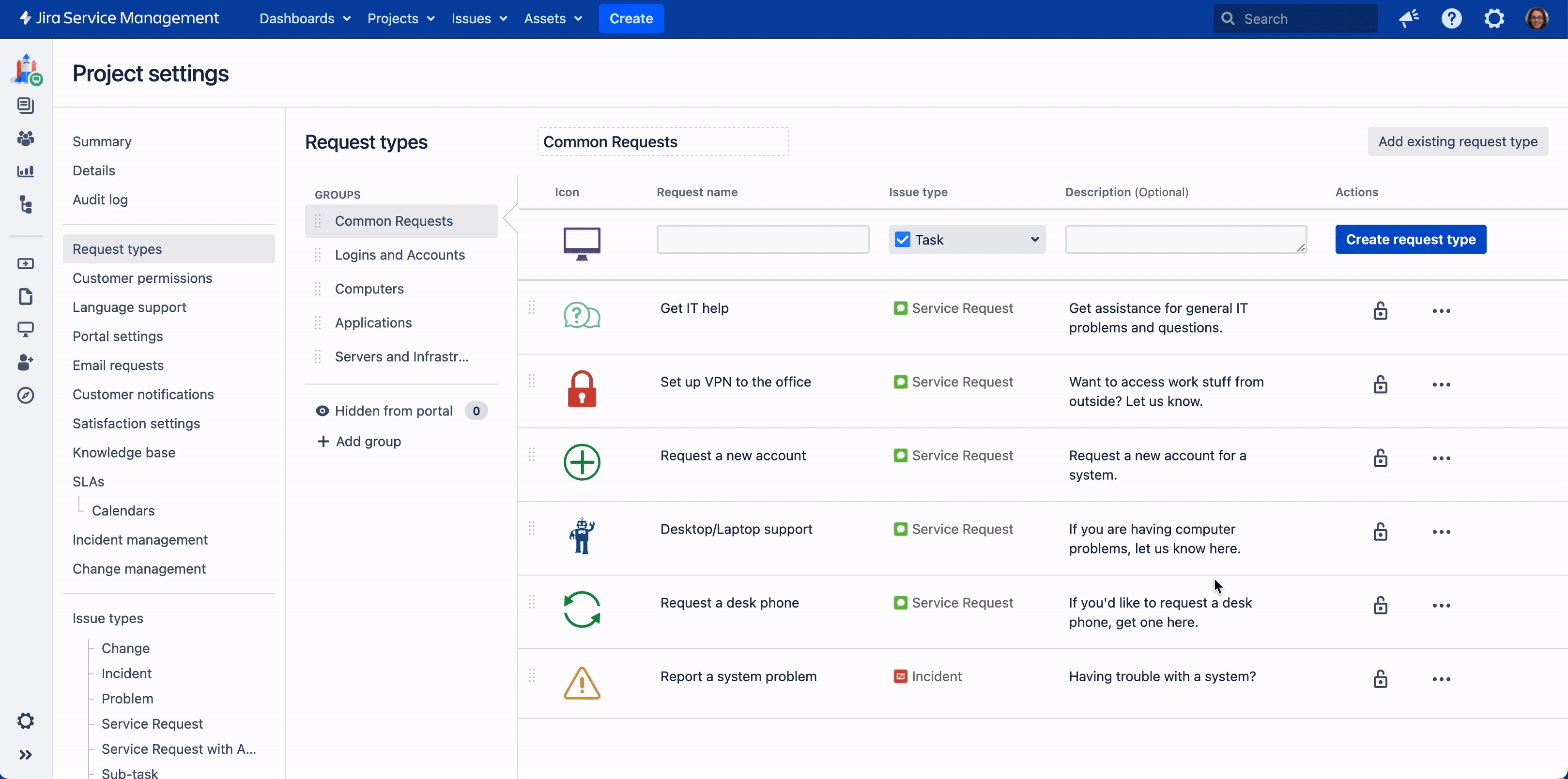Jira Service Management 10.1.x release notes
9 October 2024
We're excited to present Jira Service Management 10.1.
Highlights
Due to additional testing and the speciality of our release process, we were required to release Jira 10.1.1 instead of the planned 10.1.0 version. All the 10.1.0 features and resolved issues were moved to Jira 10.1.1.
More
Read the Jira Service Management 10.1 upgrade notes for important details about this release and see the full list of issues resolved.
Compatible applications
If you're looking for compatible Jira applications, look no further:
Streamline your request intake process
For: ADMINS
You can now add restrictions on request types to control who can raise a specific request type and make sure that requests get routed to the appropriate channels. For example, you can restrict sensitive request types like employee pay hike to just managers and HR staff. The restrictions apply to both the customer portal and the issue view. Only people (help-seekers, agents, including admins) with explicit access to that request type can create these requests. Others who don’t have access to that request type, won’t be able to raise that request as they won’t see it available as an option - even via search.
Note that restrictions can’t be applied to request types used in email channels, allowing anonymous users to send requests through these channels.
Automation access restrictions
For: ADMINS
With the ability to add restrictions to request types in Jira Service Management, we’ve changed the following automations. Jira automation will now check if the rule actor has access to create the request type used in any of your automation rules.
Create servicedesk request
Edit issue (only if the request type value changes)
Transition issue (only if the request type value changes)
The following features live in the Jira platform, which means it's available for Jira Software and Jira Service Management.
JDK 17 with the Java 16 language level
For: ADMINS
In the Jira 10.0 release notes we announced that Java 17 is now the default language level. We want to clarify that even though Jira was recompiled in JDK 17, Java 16 was used as the compilation language level.
Share usage data
For: ADMINS
We’re introducing a new way of sharing instance usage data with us. Now, the Analytics feature is called Usage data sharing and gives you more control of what you share with us.
If you decide to share the usage data of your instance, we’ll start collecting aggregated and de-identified data that we’ll use to improve the performance and scalability of our products. This knowledge will also help us communicate more effectively during a security incident, ensuring we can provide targeted advice and updates to secure your data. At the same time, we don’t collect content from within your instance.
You own your data and decide what you share with us:
- Basic data collects performance metrics and instance metadata to monitor security and performance.
- Advanced data additionally includes feature usage. We’ll use this information to improve existing features and prioritize work on the new features that best suit your needs.
- Disabled data sharing means no data is being collected.
Automation rule validation
For: ADMINS
We’re now indicating if there are any configuration errors when you open an existing rule. This helps to identify and fix rule configuration before publishing.
Webhooks auditing
For: ADMINS
We’re adding three new auditing events to the audit service’s jira.webhooks.auditing.category category and with the event type WEBHOOK:
jira.webhooks.auditing.webhook.addedjira.webhooks.auditing.webhook.modifiedjira.webhooks.auditing.webhook.deleted
This event will include:
- The
idof the webhook being altered as part of the affected object - The webhook
uri - The values that have been changed, if relevant
Secure your Jira Mobile iOS devices with OAuth 2.0
For: ADMINS
This feature is available for iOS devices only because Android supports client certificates out of the box.
Starting from Jira Data Center iOS mobile app 2.0, you can use the OAuth 2.0 authentication flow to improve your Jira’s security and enhance session restoration. Activating OAuth 2.0 will also allow your mobile device to download, store, and use client authentication certificates, such as Fast IDentity Online 2 (FIDO2).
OAuth 2.0 is compatible with the following Jira versions:
- For Jira 9.12.14 and later, use OAuth plugin 3.1.14 or later.
- For Jira 10.1.0 and later, use OAuth plugin 4.1.0 or later.
More about enabling OAuth 2.0 for Jira Mobile
Resolved issues
See the full list of the issues we’ve resolved throughout the lifecycle of Jira Service Management 10.1.



